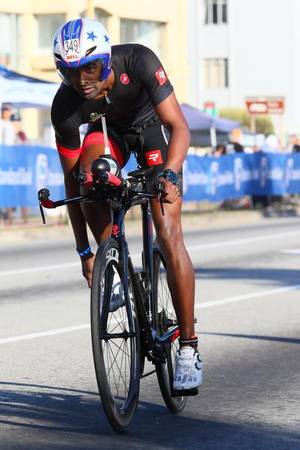An Ironman Triathlon is an extreme form of the Triathalon and consists of a 3.86-km swim, a 180-km bicycle ride and a 42.2-km marathon run, raced in that order and without a break. I
It was a warm evening in Port Elizabeth, South Africa; the sun had just begun to sink over the horizon. Raghul Sankaranarayanan vaguely remembers the crowds lined up across the last kilometre cheering the weary contestants on. What’s clearly etched in his mind is the pain — the pain from having swum 3.8 kms, cycled 180 kms and run 42.2 kms without a break in the last 11 hours.
With each thud of his shoes on the asphalt, he felt an electric pain shoot up from his ankles to his knees. There was a spasm on his right hamstring, which was close to locking up. He crossed the finish line and looked at his watch: it read 10 hours, 56 minutes and 59 seconds.
Raghul was speechless. He had just broken the Indian record of 11 hours and 3 minutes jointly held by Kaustabh Radkar and Akshay Samel. He was now officially the fastest Indian Ironman.
An Ironman Triathlon is an extreme form of the Triathalon and consists of a 3.86-km swim, a 180-km bicycle ride and a 42.2-km marathon run, raced in that order and without a break. It is widely considered one of the most gruelling one-day sporting events in the world, with a limited time of 17 hours to complete the race.
Sankaranarayanan recalls that day — April 15 — at Port Elizabeth. He says, “Everything started off badly that morning. The ocean was a bit choppy and I exceeded my goal by 2 mins, which for a swimming leg is quite a lot. To make matters worse, the aerobar on my bike broke loose at around 20 kms.”
“The aero bar is where the cyclist leans and places his elbow on, and this position helps cut wind resistance,” Sankaranarayanan explains, “I had to ride the remaining 160 kms in more of an upright position, causing me to slow down a bit and also causing my right hamstring to become a bit sore.”
“As I got off my bike at the 180-km mark, my right hamstring cramped up and the organisers had to carry me off to the side. I sat on the side of the road for a couple of minutes, wondering whether to continue or not. I still had a full marathon to run. But thankfully, after walking for a couple of kilometres, the hamstring eased up and I was able to start running at my normal pace,” he says.
The accidental athlete
Sankaranarayanan was not a born athlete. He played no sport in school and his first exposure to exercise was when he was doing marine engineering in Pune, where it was compulsory for the students to go for a 3-km run every morning. After moving to Chennai for his job, Sankaranarayanan started trekking with the Chennai Trekking Club on weekends in the hills and forest areas of Tamil Nadu and nearby states like Andhra Pradesh, Karnataka and Kerala. In March 2012, the club organised a mini triathlon, which consisted of a 750-metre swim, a 20-km cycle ride and a 5-km run. Though he struggled to finish the race, he was buoyed by it. He started training seriously, taking part in triathlons organised by the club, including a half Ironman in August 2012.
He participated in his first official Ironman in Malaysia in 2014. After completing the race in 15 hours, he was officially recognised as an ‘Ironman’ for the first time.
Sankaranarayanan says his plan for the future is to continue participating in triathlons across the world for the next 10 years. What drives him to push his body to the limit? “I’ve discovered that it’s in pushing myself beyond my comfort zone that I learn more about myself. When people talk of Ironman, they associate it with the body being as strong as iron,” he says, “But what it means to me is the strength that comes from overcoming the things I thought I couldn’t. Endurance training has taught me that true strength is not the iron of the body, but the iron within.”
source: http://www.thehindu.com / The Hindu / Home> Life & Style> Fitness / by Reji Varghese / June 11th, 2018
